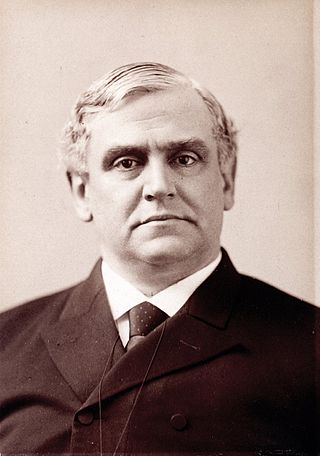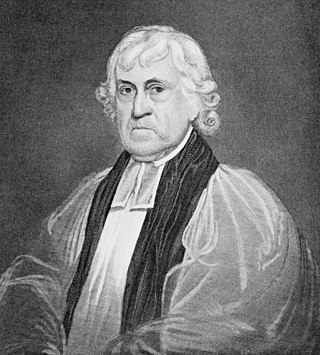Related Research Articles

James Smith Bush was an American attorney, Episcopal priest, religious writer, and an ancestor of the Bush political family. He was the father of business magnate Samuel P. Bush, grandfather of former U.S. Senator Prescott Bush, great-grandfather of former U.S. President George H. W. Bush and great-great-grandfather of former Texas Governor and President George W. Bush and former Florida Governor Jeb Bush.

Phillips Brooks was an American Episcopal clergyman and author, long the Rector of Boston's Trinity Church and briefly Bishop of Massachusetts. He wrote the lyrics of the Christmas hymn, "O Little Town of Bethlehem".

Jonathan Mayhew Wainwright I was a provisional Episcopal bishop in Manhattan, New York City.

Samuel Seabury was the first American Episcopal bishop, the second Presiding Bishop of the Episcopal Church in the United States of America, and the first Bishop of Connecticut. He was a leading Loyalist in New York City during the American Revolution and a known rival of Alexander Hamilton.

Philander Chase was an Episcopal Church bishop, educator, and pioneer of the United States western frontier, especially in Ohio and Illinois.

William Croswell Doane was the first bishop of the Episcopal Diocese of Albany in the United States. He was bishop from 1869 until his death in 1913.

Horatio Potter, was an educator and the sixth bishop of the Episcopal Diocese of New York.

Abraham Jarvis was the second American Episcopal bishop of the Episcopal Diocese of Connecticut and eighth in succession of bishops in the Episcopal Church. He was a high churchman and a loyalist to the crown.

Clement Moore Butler (1810–1890) was an Episcopal priest, author, and seminary professor who served as Chaplain of the Senate from 1850 to 1853.

The Church of the Epiphany was an Episcopal congregation in Philadelphia, Pennsylvania. Founded in 1834, it merged with St. Luke's Church in 1898 to form The Church of St. Luke and the Epiphany. Its 1834 Greek Revival building, designed by architect Thomas Ustick Walter and located at 1501-15 Chestnut Street, was demolished in 1902.

Trinity Church on the Green or Trinity on the Green is a historic, culturally and community-active parish of the Episcopal Diocese of Connecticut in New Haven, Connecticut, of the Episcopal Church. It is one of three historic churches on the New Haven Green.

Harry Croswell was a crusading political journalist, a publisher, author, and an Episcopal Church clergyman. Though largely self-educated, he received an honorary degree of A. M. from Yale College in 1817, an honorary Doctorate of Divinity from Trinity College, Hartford, Connecticut, in 1831 – an institution he co-founded – established the first public lectures in New Haven, and founded an evening school for the education of adult African-Americans in the city. He was a key figure in first amendment battles over freedom of the press and religious freedom. After abandoning politics for religion, he became the much respected Rector of Trinity Church on the Green in New Haven, Connecticut, for forty-three years, growing his church and establishing seven new churches within the original limits of his parish. Though he published fourteen books, and wrote newspaper articles as an editor and journalist weekly for eleven years, he is best known as an author for being the first person to define the word cocktail in print.

Christ Church, also known as Christ Episcopal Church, is a Christian house of worship located on the corner of Church Street and Main Street in Newton, New Jersey. It is a parish overseen by the Episcopal Diocese of Newark, a diocese of the Episcopal Church in the United States of America. The congregation first met on 28 December 1769 and was granted a charter by New Jersey's last Royal Governor William Franklin on behalf of Britain's King George III. Christ Church is the oldest church in Newton and the third oldest parish in the Diocese of Newark.

Telfair Hodgson was an American Episcopal priest and academic administrator. He was the dean of the Theological Department at Sewanee: The University of the South from 1878 to 1893, and vice chancellor from 1879 to 1890. He was a co-founder and the managing editor of The Sewanee Review.
Oliver Sherman Prescott was a prominent American Anglo-Catholic priest and activist who was active in the foundation of the Society of St. John the Evangelist. He was born in New Haven, Connecticut, and baptized by Harry Croswell at Trinity Church on the Green in that city. Prescott attended Trinity College, Hartford from 1840 to 1842 and Yale College from 1843 to 1844; he was graduated from the General Theological Seminary in New York in 1847 and made a deacon that year at Trinity Church in New Haven. He considered himself a protégé at the General of Professor Clement Clarke Moore.
Theodore Myers Riley was a prominent American Anglo-Catholic priest, author, and seminary professor born in Carlisle, Pennsylvania. A Civil War deserter from the Union Army, he was made a deacon on June 28, 1863, in the Episcopal Diocese of New York. He was ordained to the priesthood, also in the Diocese of New York, by Bishop Horatio Potter in 1866. He was a graduate of the General Theological Seminary.
William Henry Vibbert was a prominent American Hebraist and priest of the Episcopal Church. Born in New Haven, Connecticut, he was educated at the Episcopal Academy in Cheshire, Connecticut, Trinity College, Hartford and Berkeley Divinity School in Middletown, Connecticut. Following ordination to the priesthood by Bishop John Williams in 1863, he was Professor of Hebrew at Berkeley Divinity School, and rector of Christ Church, Middle Haddam, Connecticut 1863-1873; rector of St. Luke's Church, Germantown, Philadelphia (1873-1883); rector of St. James' Church, Chicago, (1883-1890); rector of St. Peter's Church, Philadelphia (1890-1891); and vicar of Trinity Chapel, Wall Street, New York. He was a deputy to the General Convention of the Protestant Episcopal Church in 1883, 1886, and 1889. He received the S.T.D. from Racine College in 1883. At St. James', Chicago, Vibbert assisted in the 1883 foundation of the Brotherhood of St. Andrew for laymen.
Benjamin Isaac Haight was a prominent Episcopal priest, author, and seminary professor of the nineteenth century, as well the first appointed Custodian of the Standard Book of Common Prayer in the United States. Haight served as professor of pastoral theology at the General Theological Seminary (GTS) in New York from 1837 to 1855.
Thomas Richey was a prominent Irish-American Anglo-Catholic priest, professor, and author in the Episcopal Church. He was born in Newry, County Down, in Ireland and had settled in Pittsburgh by 1847, following his graduation at 16 from Queen's College, Belfast. Richey was a tutor at St. James College, Hagerstown, Maryland under John Barrett Kerfoot from 1848-1851. He was graduated from the General Theological Seminary of the Episcopal Church in 1854 and ordained to the priesthood by Bishop Horatio Potter in 1855.
Carl Eckhardt Grammer was a prominent Episcopal priest, author, and commentator on American Indian affairs. He was an exponent of liberal evangelical positions in church controversy. Grammer was a supporter of women's suffrage and a widely published opponent of the American Missal.
References
- "Rev. Dr. Henry Harrison Oberly," in The New York Times, March 20, 1914, p. 11.
- "Rev. Dr. Henry H. Oberly," in Hartford Courant, March 22, 1914, p. 9.
- "Long Rector in Elizabeth, N.J." in Boston Evening Transcript, March 20, 1914, p. 12.
- "Episcopal Rector Died Yesterday" in Bridgewater Courier-News, March 20, 1914, p. 7.